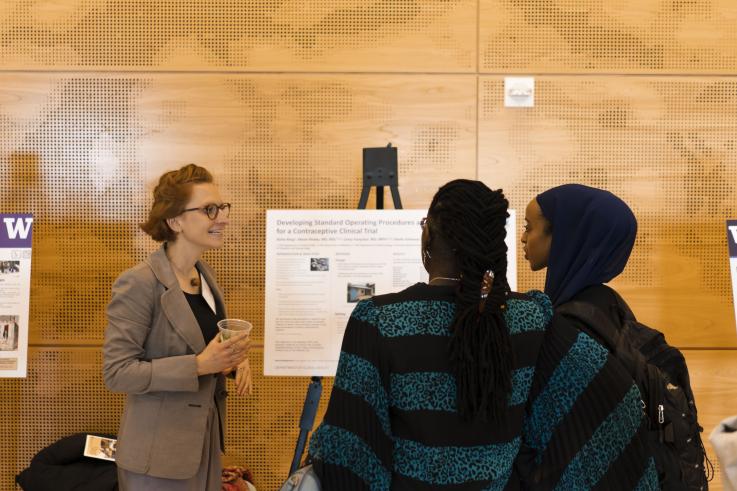
Prior to earning their Master of Public Health (MPH) degree, all students in the University of Washington School of Public Health must complete a practicum project, in which they take the knowledge they’ve gained in the classroom and apply it to the real world.
This year, 14 Department of Global Health students presented their work at the UW MPH Practicum Symposium. Their work ranged from local ventures in the Seattle area to projects based in Kenya and Namibia. Working with faculty mentors, students sought to create real community change during this essential part of their education.
Alessandra Angelino, a fourth-year medical student simultaneously pursuing an MPH in Global Health, chose Seattle Children’s Hospital’s Center for Diversity and Health Equity as her practicum site. Access to strong and culturally appropriate medical care is Angelino’s passion, leading to tangible and impactful work in the same field. Angelino created a toolkit to provide resources for LGBTQ youth, particularly those of American Indian or Alaska Native backgrounds. This toolkit will soon be circulated to clinics in Washington as part of a pilot run, with the intention of spreading to the rest of the United States afterward. After receiving her degree, Angelino hopes to continue working with gender-expansive youth and apply for a residency in Pediatrics.
Kathryn Kemper is a second-year MPH candidate in the Department of Global Health. An interest in cancer screening and treatment, reproductive health, and health system engineering formed the foundation of her practicum project. Kemper joined forces with International Training and Education Center for Health (I-TECH) to gather and study cervical cancer screening data in Namibia. To do this, Kemper and I-TECH conducted interviews with healthcare workers and recorded the challenges facing the current monitoring and evaluation systems. Kemper says the desire to get an MPH came from wanting to bridge the gap between research and implementation. Post-graduation, Kemper wants to do research in collaboration with local governments, both in the United States and abroad.
Aisha King’s practicum site in Kenya offered insight into male contraceptive habits. At the Kenyatta National Hospital, the Global Health student ran a clinical trial that assisted in implementing male contraceptive practices. Not only did King want to change the practices and implementation of male contraception in Kenya, they also wanted to shift the collective attitude about it. The trial put this plan into action by introducing standard operating procedures and training materials across nine different testing sites.
The University of Washington’s MPH program allows students to perform practical, skills-based work that both prepares them for the future and teaches the history of health-related issues. The cohort-based programming, collaborative environment, and multitude of global partnerships are among many reasons why students gravitate to the MPH program, which annually admits 35-50 new students and is roughly 33% foreign students.